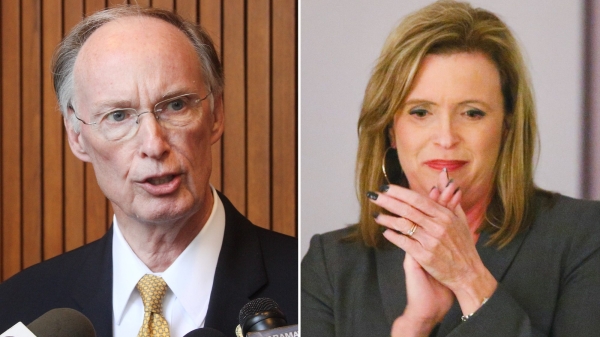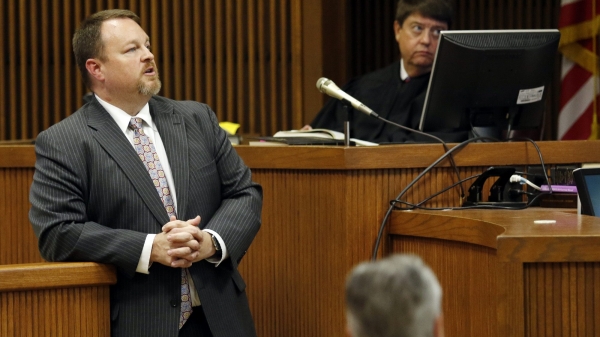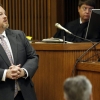By Baron Coleman
Some legislator needs to propose a law for the upcoming regular session mandating the Alabama Ethics Commission become the Alabama “Ethics” Commission, with “Ethics” in quotes. In addition, each time the Commission or someone referring to the Commission uses the term “ethics,” it should be in quotes. Quotes used derisively tend to debase, demoralize, and degrade. The Alabama “Ethics” Commission. It’s more accurate this way.
Compare two opinions from the soon-to-be-renamed Alabama “Ethics” Commission. The first is the Fridy opinion, issued in February 2015 to recently elected Rep. Matthew Fridy (R-Montevallo). The other is the Todd opinion, issued in October 2015 to veteran Rep. Patricia Todd (D-Birmingham). Two opinions separated by a mere eight months of time, but also Aristotelian logic and the canons of statutory construction.
Shortly after winning election in 2014, Rep. Friday, an attorney practicing in Birmingham, stumbled over a provision in the Alabama ethics laws that prompted him to seek guidance from the Alabama “Ethics” Commission. During the 2014 regular legislative session, the Alabama legislature made it illegal to serve in the legislature and represent clients for a fee in the Alabama judicial system. In pertinent part, Alabama Code 36-25-23(a) states as follows:
“No public official elected to a term of office shall serve for a fee as a lobbyist or otherwise represent a client, including his or her employer, before any legislative body or any branch of state or local government, including the executive and judicial branches of government, and including the Legislature of Alabama or any board, agency, commission, or department thereof, during the term or remainder of the term for which the official was elected.”
Public officials, which includes legislators, can’t be lobbyists or represent clients before the judicial branch of government. Period.
In order to simultaneously practice law in Alabama courts and serve in the legislature, Rep. Fridy needed someone to destroy logic, redefine words, and ignore hundreds of years of statutory construction.
Enter the Alabama “Ethics” Commission.
The problem Rep. Fridy faced was the statute making him a potential criminal included the very clear words “No public official.” For mere mortals, such clear language is a problem. “Public official” is defined in the code and clearly covers Rep. Fridy. And, well, “no” means no.
Embedded in the words “No public official,” the “Ethics” Commission found the word “former.” Seriously. According to the “Ethics” Commission, it’s buried in there between the “no” and “public.” After a 5-0 vote from the “Ethics” Commission, the phrase “no public official” now means “no FORMER public official.” Here’s how they termed it in the Fridy opinion.
“Section 36-25-23 prohibits a former public official from representing clients, including his or her employer for the remainder of the term to which they were elected, should they leave early, and for an additional two years under the “Revolving Door” provisions. It was not intended to, nor does it prohibit attorneys in the Legislature from practicing law and representing clients before courts and administrative agencies around the state of Alabama.”
Voila! A ban on lawyers who represent clients in courts also serving as public officials is gone!
See how that works? I don’t either. Because the statute did exactly what the “Ethics” Commission said it didn’t do. It prohibited attorneys in the Legislature from representing clients before courts. Period.
How do we know this?
I mean, apart from the very clear language of the statute, how do we know this? Because eight months later, in October 2015, the “Ethics” Commission abandoned its belief the word “former” ought to be magically inserted into that same code section.
Rep. Patricia Todd unbelievably and shamelessly asked the “Ethics” Commission whether she could simultaneously serve as a lobbyist and a legislator. Standing in the way of Rep. Todd posting her lobbying fee schedule next to the nameplate outside her office was the very same statute Rep. Fridy found troublesome.
This time, the “Ethics” Commission forgot they had magically inserted the word “former” into the statute. Had they remembered, Rep. Todd’s opinion might have turned out even more favorable to her than it did. Not that she should complain. The “Ethics” Commission gave her permission to be employed by a lobbying organization with lobbyists on the payroll. But they wouldn’t go as far as letting Rep. Todd personally do any paid lobbying. Here’s how they put it in the Todd opinion:
“Reading these definitions together, while serving as an elected official the official cannot be paid for the purpose of promoting or “in any manner” attempting to influence the introduction or defeat of legislation before “any legislative body” which includes local legislative bodies.”
In February 2015, the statute only applied to former public officials. By October 2015, the statute applies “while serving as an elected official.”
What’s the “Ethics” Commission to do? Tell lawyers they can’t serve in the legislature? Isn’t it easier to “correct” the statute by adding the word “former” to it to make sure it doesn’t apply to current legislators?
Once they’ve added the word “former” to the statute for the benefit of lawyer-legislators who want to practice law, should they keep the word “former” in place for the benefit of would-be lobbyist-legislators? Even the “Ethics” Commission knows absurdity has limits before the public and law enforcement start wondering what exactly is going on up there.
So they add “former” to the statute for Fridy, but strip it for Todd. Same statute. Same plain language. Same “Ethics” Commission. Two completely opposite interpretations.
If the “Ethics” Commission doesn’t have the ethics to point out when laws outlaw behavior, it should face an existential crisis. Legislators know the Alabama “Ethics” Commission ceased being the Alabama Ethics Commission years ago. The Fridy/Todd paradox is just one of many examples of the Commission’s willingness to sacrifice all credibility and ethics to benefit legislators.
The proper thing for the “Ethics” Commission to do was to tell Rep. Fridy the unfortunate reality that the Alabama legislature has a long and complicated history of passing really bad legislation, but that it’s not the job of the “Ethics” Commission to re-write bad legislation. That’s the legislature’s job. The statute might have been bad public policy, but it was crystal clear. And logic, simple reading comprehension skills, and hundreds of years of statutory construction prevent crystal clear laws from being interpreted out of existence. If the legislature didn’t intend to outlaw lawyers serving as public officials, they should change the law, not count on the “Ethics” Commission to change what the law says.
It’s quite possible that adding quotes to the Alabama “Ethics” Commission doesn’t go far enough, but it’s a start. If we find the Alabama “Ethics” Commission is past the point of being shamed by derogatory punctuation, then the next step is to dismantle it completely, give its responsibilities to the Attorney General and the Secretary of State, and start over.


















































